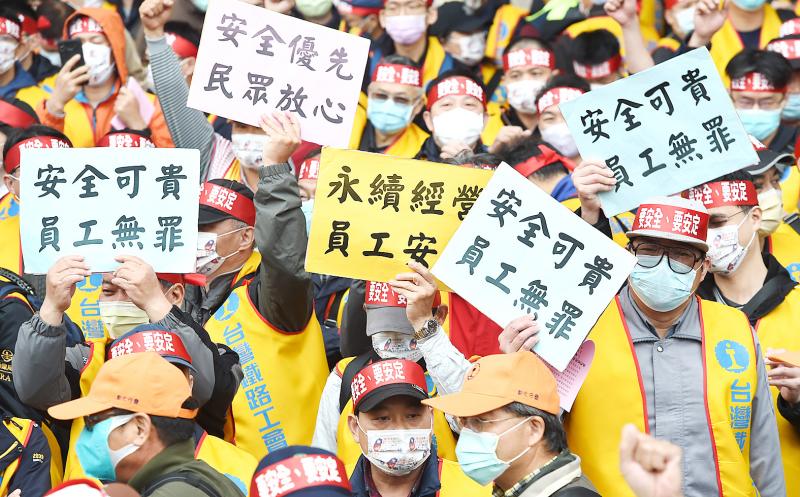More than 1,000 Taiwan Railways Administration (TRA) workers yesterday protested the Ministry of Transportation and Communications’ plan to corporatize the agency, saying that the ministry drafted the statute establishing Taiwan Railway Corp without thoroughly communicating with the workers’ unions.
Members of the Taiwan Railway Labor Union (TRLU) and two other unions in the railway agency marched from Taipei Railway Station to the Legislative Yuan and handed a petition to lawmakers serving on the legislature’s Transportation Committee.
TRLU chairman Chen Shih-chieh (陳世杰) said that the union organized the protest because the ministry sent the draft statute for legislative review without first reaching an agreement with the unions.

Photo: Liao Chen-huei, Taipei Times
“We hope that both the government and legislators can listen to the voice of TRA workers, who have qualms about the ministry’s plan to turn the agency into a state-run corporation,” he said. “We will decide what to do next if we do not get a goodwill response.”
The ministry and the union disagree on 12 articles in the statute, he said, adding that workers do not believe the ministry’s promises of better salaries and benefits.
“Once the agency becomes a state-run corporation, it will sell many of its properties to pay off debts accumulated over the years. Railway services in advanced countries generate 60 percent of their revenue from non-railway-related businesses. How can the TRA make any money and provide more benefits to its workers if it sells its properties?” Chen asked.

Photo: Liao Chen-huei, Taipei Times
The ministry’s proposed amendments to the Railway Act (鐵路法) and the draft statute for the establishment of Taiwan Railway Corp would increase the percentage of the TRA’s non-railway-related business revenue to 60 percent from 17 percent, Minister of Transportation and Communications Wang Kwo-tsai (王國材) told reporters on the sidelines of the Transportation Committee hearing.
The revenue would be used to pay off its accumulated debts of NT$140 billion (US$4.9 billion) and lay a solid foundation for the soon-to-be-established railway corporation, Wang said.
“The Railway Bureau owns and manages properties around high-speed rail stations, and it can allow private users to lease the properties or allow them to develop properties without owning the right of superficies,” he said. “The same principle would apply to Taiwan Railway Corp, which means no land would be sold.”
Wang dismissed accusations that the ministry intends to inflate its property values by turning the TRA into a state-run corporation, saying that “the union has clearly misunderstood him.”
The government relaxed regulations to raise the railway operator’s revenue, which could in turn enhance the safety and quality of the railway service, he said.
Wang said he hoped to have rational discussions with union members at a hearing today concerning their doubts about the ministry’s plan.

‘DENIAL DEFENSE’: The US would increase its military presence with uncrewed ships, and submarines, while boosting defense in the Indo-Pacific, a Pete Hegseth memo said The US is reorienting its military strategy to focus primarily on deterring a potential Chinese invasion of Taiwan, a memo signed by US Secretary of Defense Pete Hegseth showed. The memo also called on Taiwan to increase its defense spending. The document, known as the “Interim National Defense Strategic Guidance,” was distributed this month and detailed the national defense plans of US President Donald Trump’s administration, an article in the Washington Post said on Saturday. It outlines how the US can prepare for a potential war with China and defend itself from threats in the “near abroad,” including Greenland and the Panama

The Chinese Nationalist Party (KMT) is maintaining close ties with Beijing, the Democratic Progressive Party (DPP) said yesterday, hours after a new round of Chinese military drills in the Taiwan Strait began. Political parties in a democracy have a responsibility to be loyal to the nation and defend its sovereignty, DPP spokesman Justin Wu (吳崢) told a news conference in Taipei. His comments came hours after Beijing announced via Chinese state media that the Chinese People’s Liberation Army’s Eastern Theater Command was holding large-scale drills simulating a multi-pronged attack on Taiwan. Contrary to the KMT’s claims that it is staunchly anti-communist, KMT Deputy

RESPONSE: The government would investigate incidents of Taiwanese entertainers in China promoting CCP propaganda online in contravention of the law, the source said Taiwanese entertainers living in China who are found to have contravened cross-strait regulations or collaborated with the Chinese Communist Party (CCP) could be subject to fines, a source said on Sunday. Several Taiwanese entertainers have posted on the social media platform Sina Weibo saying that Taiwan “must be returned” to China, and sharing news articles from Chinese state media. In response, the Mainland Affairs Council (MAC) has asked the Ministry of Culture to investigate whether the entertainers had contravened any laws, and asked for them to be questioned upon their return to Taiwan, an official familiar with the matter said. To curb repeated

Myanmar has turned down an offer of assistance from Taiwanese search-and-rescue teams after a magnitude 7.7 earthquake struck the nation on Friday last week, saying other international aid is sufficient, the National Fire Agency said yesterday. More than 1,700 have been killed and 3,400 injured in the quake that struck near the central Myanmar city of Mandalay early on Friday afternoon, followed minutes later by a magnitude 6.7 aftershock. Worldwide, 13 international search-and-rescue teams have been deployed, with another 13 teams mobilizing, the agency said. Taiwan’s search-and-rescue teams were on standby, but have since been told to stand down, as